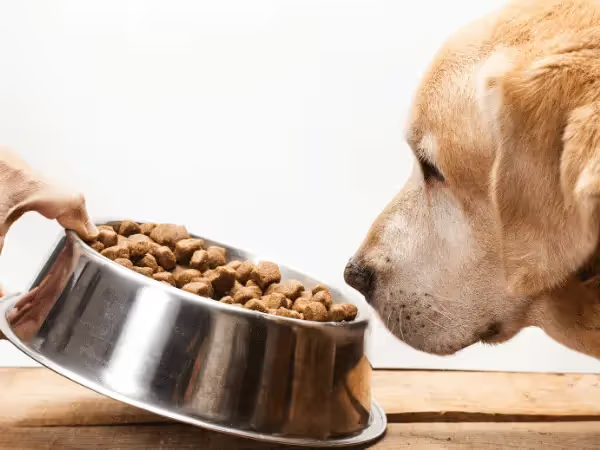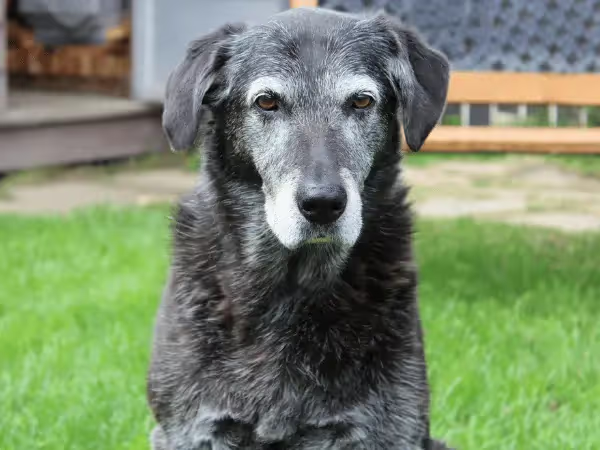Noticing your dog losing weight can be worrying, especially if you aren’t sure why it’s happening. Sometimes, weight loss can be tied to something as simple as increased activity or a change in appetite. Other times, it could be a symptom of an underlying medical or age-related issue (i.e., elderly dogs losing weight).
Understanding the reasons behind your dog’s weight loss is the first step toward helping them regain a healthy balance. This Sploot Vets guide explores common causes of weight loss in dogs, providing answers for a common question among pet parents: “Why is my dog losing weight?”
Overview: Why is My Dog Losing Weight?
- Weight loss in dogs can occur at any age, and there are various potential reasons why.
- Some dogs may experience weight loss due to metabolic issues and nutritional deficiencies. In other cases, the reason could be due to parasitic infections and systemic disease.
- In addition, it is common to observe older dogs losing weight; in such cases, the reasons are tied more closely to age-related changes and/or illnesses.

I. My Dog is Losing Weight But Eating Normally [Diet, Metabolic, & Lifestyle]
When your dog’s appetite seems unaffected, but their weight is still dropping, it may point to metabolic, nutritional, or lifestyle causes, such as the following:
1. Increased Activity Levels
Increased activity levels are commonly tied to dogs losing weight. If your dog has had a boost in exercise, playtime, or outdoor adventures, they may be burning more calories, leading to weight loss. Oftentimes, this kind of weight loss is gradual and may not have any additional symptoms.
Do you need to see a vet?: It depends. It’s best to consult a vet if your dog’s weight loss is dramatic, paired with uncharacteristic lethargy, or if they are close to going under their healthy weight range.
2. Metabolic Disorders
Diseases such as canine diabetes or hyperthyroidism (rare in dogs but still possible) can speed up metabolism, making it harder for dogs to maintain a healthy weight. This could be causing your dog’s sudden weight loss.
Do you need to see a vet?: If you are also noticing symptoms like increased thirst, frequent urination, and increased appetite, this could be pointing to diabetes. If your dog is experiencing restlessness, a rapid heart rate, and increased appetite, this can be due to hyperthyroidism. In both cases, it would be best to consult a vet.
3. Low-Quality or Unbalanced Diet
Even if your dog is eating the right volume of food, poor-quality ingredients or an unbalanced diet may not meet their nutritional needs. This could be the reason why they are losing weight, especially if your dog has recently been on a new diet that’s not recommended or overseen by a trusted veterinarian.
Do you need to see a vet? To be on the safe side, book a nutritional consultation with an all-in-one vet clinic. Vets can assess your dog’s nutrition while also ruling out other possible causes of sudden weight loss.
4. Food Aversion or Picky Eating in Dogs
Subtle changes in flavor, texture, or smell can cause your dog to eat less than you realize, especially if they’re a picky eater. Picky eating in dogs is highly common, especially if they’ve just been introduced to a new dog food.
Do you need to see a vet? Observe if your dog is regularly clearing their bowl or leaving out certain foods. If they continue picky eating behaviors, it might be time to switch to a new dog food; this is best done gradually and with vet approval.

II. Do Dogs Lose Weight When Sick? [Illnesses & Health Conditions]
Yes, dogs can lose weight when they are sick. In fact, illness or disease in dogs is one of the most common reasons for unexplained weight loss. If sickness is the cause, you’ll often notice additional symptoms alongside the weight loss.
1. Canine Parasitic Infections
Worms in dogs, such as hookworms, whipworms, or tapeworms, can rob your dog of essential nutrients, leading to weight loss over time. This could be the cause of your dog’s weight drop, especially if they are not on any preventatives for intestinal worms.
Do you need to see a vet?: Yes, seek veterinary care for suspected intestinal parasites, especially if your dog also has diarrhea, vomiting, or a bloated abdomen.
2. Inflammatory Bowel Disease in Dogs
Inflammatory bowel disease in dogs can prevent your pet from absorbing the nutrients they eat, even with a healthy appetite. A few common symptoms of IBD in dogs, aside from weight loss, include chronic vomiting, diarrhea, excess gas, and abdominal discomfort
Do you need to see a vet?: Yes, inflammatory bowel disease in dogs needs prompt veterinary care, especially if the symptoms are persistent or worsening.
3. Dental Disease in Dogs
Pain from dog dental issues or gum infections can make eating uncomfortable, leading to reduced food intake and weight loss. A few symptoms to look for include: bad breath, drooling, dropping food while eating, chewing on only one side, and bleeding gums.
Do you need to see a vet?: Yes, reach out to a vet if you notice concerning dental symptoms. Early intervention can help prevent dental problems from escalating. However, Sploot Medical Director Dr. Molly Wozniak reminds pet parents: “Loss of appetite and weight loss is oftentimes attributed solely to dental issues in dogs when, in many cases, there’s another issue causing (or contributing to) a dog's weight loss. This is why a thorough wellness exam is recommended.”

4. Chronic Infections in Dogs
Bacterial or fungal infections in dogs can place extra demands on your dog’s body, which may lead to weight loss. Whether the infection is external (e.g., skin, ears) or internal (e.g., intestinal, urinary), it can still take a toll on your dog’s body. Infections can also affect their appetite, contributing to weight loss.
Do you need to see a vet?: Yes, in such cases, it would be best to consult a vet promptly, especially if your dog is also experiencing fever, coughing, or lethargy.
5. Kidney or Liver Disease in Dogs
Chronic conditions like kidney disease and liver disease in dogs can alter their metabolism, reduce their appetite, and impact nutrient absorption, resulting in gradual weight decline.
Do you need to see a vet?: Absolutely! If you suspect any systemic issues in your dog, early intervention is best. Reach out to a trusted vet promptly..
6. Canine Heart Disease
Heart issues can also impact a dog’s weight, potentially causing weight loss. This is known as cardiac cachexia, a form of malnutrition and muscle loss associated with heart failure or advanced heart disease in dogs.
Do you need to see a vet?: Yes, heart issues can worsen quickly without medical management. It’s best to see a vet as soon as possible.
7. Cancer in Dogs
Cancer can be a reason why a dog is losing weight. Certain cancers increase the body’s energy demands, trigger muscle wasting, and/or cause pain, which can reduce the dog’s appetite. Some or all of these factors can contribute to a dog losing weight.
Do you need to see a vet?: Yes, unexplained weight loss should be investigated promptly to rule out cancer in dogs, especially for susceptible dog breeds like Golden Retrievers, Boxers, and Bernese Mountain Dogs.

III. Why Is My Elderly or Old Dog Losing Weight? [Age-Related]
An older dog losing weight is a common issue. Older or senior dogs often lose weight due to age-related factors and common health issues at this life stage. Here is a general guide as to when dogs become senior:
- Small dogs – at least 8 - 11 years old
- Medium-sized dogs – at least 8 - 10 years old
- Large dogs – at least 6 - 8 years old
1. Muscle Loss (Sarcopenia) in Older Dogs
Natural aging can lead to reduced muscle mass, especially if activity levels decrease.
Do you need to see a vet?: Not urgently if it’s gradual and your dog is otherwise healthy, but seek care if you observe weakness, difficulty standing, or decreased mobility in your dog.
2. Age-Related Changes in Metabolism
Sometimes, older dogs lose weight because their nutritional needs are not being met. Senior dogs may metabolize food differently, sometimes needing more calories or specific nutrients to maintain a healthy weight.
Do you need to see a vet?: Yes, especially if you also notice reduced muscle tone, dull coat, or ongoing fatigue. Your senior dog may need a personalized senior dog food recommendation, appropriate for their age and individual needs.
3. Chronic Illness in Senior Dogs
Conditions like arthritis, organ disease, or cancer become more common with age and can contribute to weight loss in older or elderly dogs.
Do you need to see a vet?: Yes, it’s best to get your dog checked, especially if you see joint stiffness, lethargy, and/or loss of appetite.

Final Thoughts on Dog Losing Weight
Whether your dog is losing weight quickly or gradually, the safest approach is to have them evaluated by a veterinarian. Early detection of underlying issues (whether it’s dietary, metabolic, illness-related, or age-related) can make treatment more effective and improve your dog’s quality of life.
Sploot Vets: Your All-in-One Vet
Sploot Vets offers top-tier veterinary care with a Fear Free approach, ensuring pets feel as comfortable as possible during visits. Our team supports the health needs of dogs of all ages—from puppies to seniors. We offer primary care, urgent care, and emergency vet services, all under one woof™!
With convenient locations in Denver, Chicago, and Colorado Springs, our vet clinics are open 365 days a year, with extended hours for your convenience.
Book an appointment easily online or through the Sploot Vets app!






